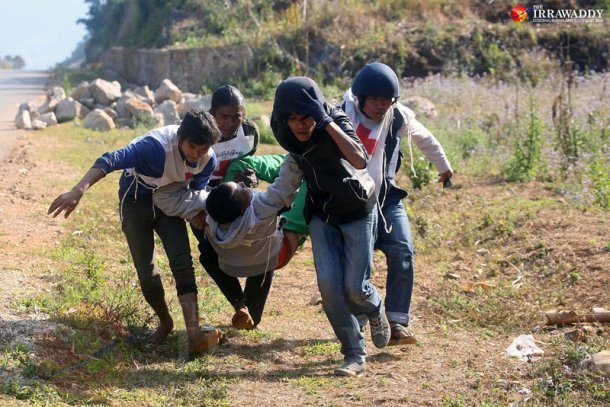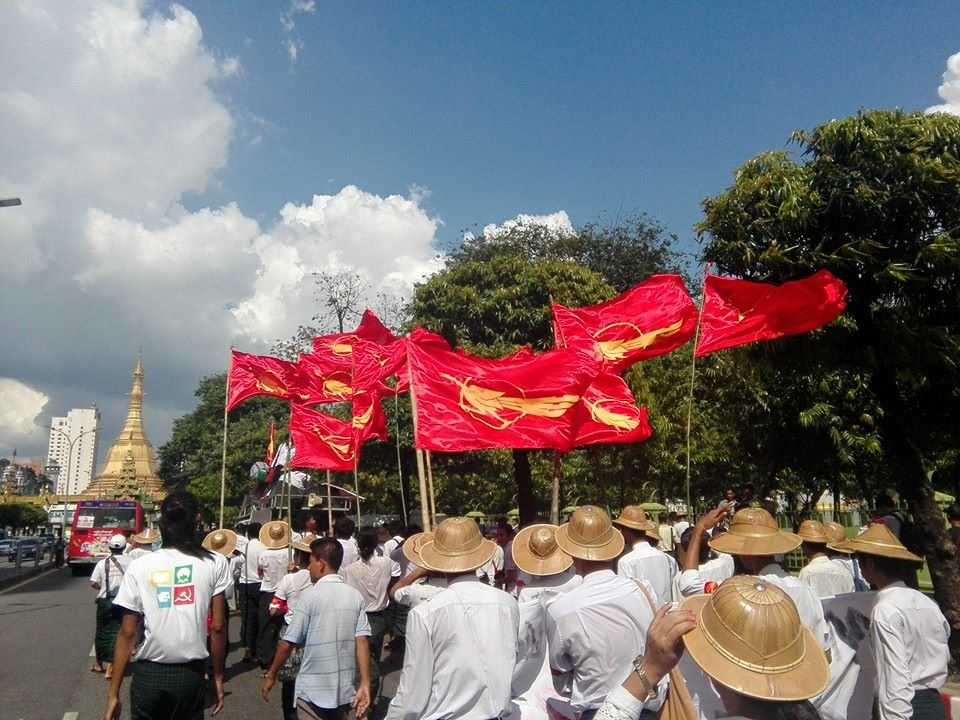Posts Tagged ‘students’ (22 found)
Statement No.(11/2015) Statement regarding the Application of bail for the (4 )Student Demonstrators of Yadanarpon University, Mandalay Region to Appear for the Examination Statement
According to the information appearing in the media it was learnt that 3rd year Biochemistry student Ko Naing Ye Wai, 3rd Year Microbiology, Ko Jit Too, 4th Year Physics, Ko Aung San Oo and 4th year Maths, Ko Nyan Linn Htet are students currently studying at the Yadanarpon University […]
• • •Myanmar: End Clampdown on Student Protesters and Supporters
Authorities in Myanmar must end their on-going clampdown on student protesters and their supporters, said Amnesty International today […]
• • •Official Statement of Detained Student Protesters and Supporters
Released to fellow students and general public by Community-Based Legal Assistance Network as requested officially by the detainees
• • •Statement of Detained Students
First of all, we would like to express our deep gratitude to the people and civil society groups for supporting our peaceful protests […]
• • •Walking into Beatings, Running Away from Gunfire
 This week has seen the various organs of the state being employed to oppress and commit violence against students marching for education reform, workers striking for their rights, and ethnic nationality Kokang fleeing conflict. Thus we have seen the use of guns, thugs, repressive laws, and police brutality, exposing not just the range of the tools of government subjugation of its people, but the depths to which it will go to maintain power.
This week has seen the various organs of the state being employed to oppress and commit violence against students marching for education reform, workers striking for their rights, and ethnic nationality Kokang fleeing conflict. Thus we have seen the use of guns, thugs, repressive laws, and police brutality, exposing not just the range of the tools of government subjugation of its people, but the depths to which it will go to maintain power.
In downtown Rangoon on 5 March, 2015, around 200 people gathered to show their solidarity with the student marchers, currently barricaded by police in the town of Letpadan, 85 miles from Rangoon. This solidarity demonstration was violently broken up, not just by police, but by a gang of thugs, employed by the police to create disturbances and assault the protestors. These thugs, wearing red armbands with the word ‘duty’ are reminiscent of Swan Ah Shin group, who were used by the previous military regime in the Depayin Massacre in 2003 in which members of the National League for Democracy (NLD) were murdered, as well as the 2007 Saffron Revolution. Eight protestors were also detained overnight, including three members of the 88 Generation Peace and Open Society group. Meanwhile, the 100 students barricaded in Letpadan remain, with 500 police officers surrounding them, as the government refuses to allow them to continue their march to Rangoon.
• • •ဒီမုိကေရစီ ပညာေရးလွဳပ္ရွားမွဳ ဦးေဆာင္ေက်ာင္းသားမ်ား၏ ခ်ီတတ္ဆႏၵျပမႈအေပၚ လူ႔အခြင့္အေရး ကာကြယ္ျမွင့္တင္သူမ်ားအဖြဲြ႕ (HRDP) ၏ ထုတ္ျပန္ခ်က္
ဒီမုိကေရစီ ပညာေရး လွဳပ္ရွားမွဳ ဦးေဆာင္ေက်ာင္းသားမ်ား၏ ခ်ီတက္ဆႏၵျပမႈၾကီးသည္ လူ႔အခြင့္အေရး စံခ်ိန္ စံညႊန္းမ်ားႏွင့္ လုံး၀ကုိက္ညီမွဳ ရွိေပသည္။ လြတ္လပ္စြာ ပညာသင္ၾကားခြင့္ကုိ ေတာင္းဆုိျခင္း၊ အခ်ဳပ္အျခာ ကင္းသည့္ ပညာေရး လြတ္လပ္ခြင့္ကုိ ေတာင္းဆုိျခင္းတုိ႕ေၾကာင့္ ယေန႔ေက်ာင္းသားတုိ႔ သပိတ္ေမွာက္ ေတာင္းဆုိျခင္းသည္ လူ႔အခြင့္အေရးဆုိင္ရာ ခုခံကာကြယ္ျခင္းျဖစ္ေပသည္။ […]
• • •အမ်ဳိးသား ပညာေရးဥပေဒအား ေက်ာင္းသားမ်ား ကန္႔ကြက္ဆႏၵျပျခင္းအေပၚ ၈၈မ်ဳိးဆက္ (ၿငိမ္းခ်မ္းေရးႏွင့္ ပြင့္လင္း လူ႔အဖြဲ႕အစည္း)၏ သေဘာထားေၾကညာခ်က္
(၁) အမ်ဳိးသား ပညာေရး ဥပေဒသည္ ေက်ာင္းသားမ်ား၏ အနာဂတ္၊ တနည္းအားျဖင့္ လူသား အရင္းအျမစ္ ဆုိင္ရာ ႏုိင္ငံ၏ အနာဂတ္လည္းျဖစ္သည္။ […]
• • •Statement regarding the Need for Creation of National Education Policies and Laws for Realization of Democratic Education System
Action Committee for Democratic Education (ACDE) is comprised of All Burma Federation of Student Unions and University Student Unions. The Committee was established and its members were elected during the nationwide student emergency conference convened on 12-13 November 2014 […]
• • •Statement of civil society organization on students’ actions against National Education Law following the overdue 60-day deadline for negotiation
Education sector reform during transition period is very important and vital for the future of Myanmar
The 60-day period for negotiation declared by students has passed and students have resumed their protest activities against the National Education Law. Student from Mandalay have begun their march from Mandalay to Yangon on the 20 January while students from other parts of the country have carried out their protest activities in their respective areas as well […]
As 2014 Comes to an End, Students Hold Key to New Chapter in Burma Politics
 As we count down the remaining days of 2014, Burma Partnership takes a look back at what 2014 has offered. It has been nearly four years since President Thein Sein’s administration took office, and now is the time to digest all the developments during his presidency, to assess what the so-called reform process has really meant for the people of Burma thus far. And now is the time to properly examine this new political landscape and to determine who is who.
As we count down the remaining days of 2014, Burma Partnership takes a look back at what 2014 has offered. It has been nearly four years since President Thein Sein’s administration took office, and now is the time to digest all the developments during his presidency, to assess what the so-called reform process has really meant for the people of Burma thus far. And now is the time to properly examine this new political landscape and to determine who is who.
By the time the reforms were announced, everything was already set in motion to ensure that the reform process was controlled and manipulated by members of the old military regime. Looking at the notorious 2008 Constitution, the institutionalized prescription of 25 per cent of the seats in Parliament for military representatives, the dominance of the Union Solidarity and Development Party, the excessive power of the Burma Army and the National Defense and Security Council, and the growing investment of the State and affiliated business cronies in the media sector, it is not hard to conclude that a new system of repressive governance has been installed – by the same people who were once considered one of the most brutal and authoritarian regimes in the world.
However, it is important to remain hopeful. Although the new political landscape has contributed to the sophistication of old problems and the development of new problems, it has also offered Burma people new opportunities. One of the most inspiring aspects of the political developments in 2014 has been the reinstatement of the role of student unions in the country’s political affairs. Burma’s students were always at the center of major democracy movements throughout history – most notably in 1988 – and have now made a comeback. […]
• • •








 All posts
All posts